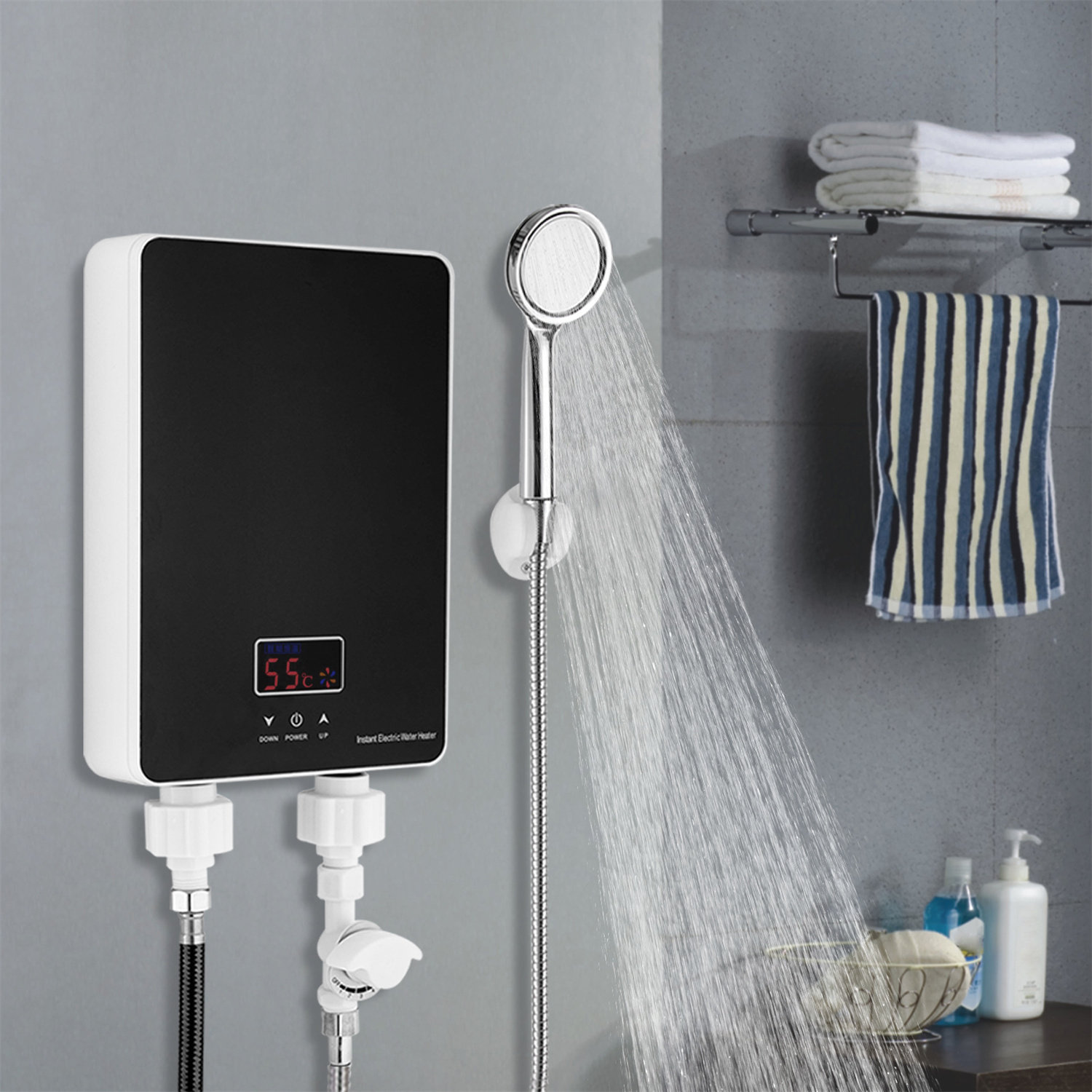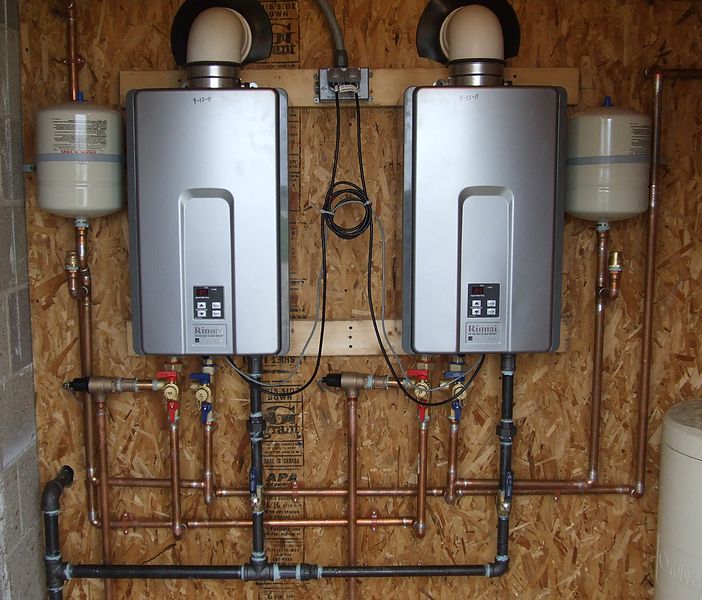Important Benefits Of Switching To Tankless Water Heaters
Important Benefits Of Switching To Tankless Water Heaters
Blog Article
Are you currently on the lookout for ideas about Why You Should Consider a Tankless Water Heater?

In a globe where ease and performance preponderate, it's not a surprise that house owners are regularly on the lookout for smarter ways to handle their home's energy intake and convenience. One technology that has progressively gained appeal is the tankless hot water heater. Yet what exactly makes these systems attract attention from the standard tank-based models the majority of us matured with? Allow's dive in and check out the advantages of tankless hot water heater, aiding you make a decision if it's time to make the button in your house.
Introduction
Picture this: you step into the shower after a lengthy day, expecting a relaxing cascade of warm water, just to be welcomed by icy beads since the last individual used it all up. Noise acquainted? Conventional water heaters keep a set quantity of hot water, indicating you go to the mercy of that storage tank's supply. Tankless systems, on the other hand, warmth water as needed. No more running out mid-shower, no more fumbling with timetables just to guarantee hot water is offered.
Comprehending Tankless Hot Water Heater
What Are Tankless Hot Water Heater?
Tankless hot water heater, sometimes known as on-demand or instant hot water heater, offer hot water only as it's required. As opposed to saving gallons of pre-heated water, these devices kick into activity the moment you activate the tap. Water travels through a warm exchanger, warming up in real-time, implying you obtain an uninterrupted circulation of warm water without the requirement for a large container sitting idly by.
Just how Do They Differ from Traditional Systems?
Conventional heaters hold a storage tank of hot water, making use of energy to keep that container at a constant temperature level. Tankless units get rid of the standing supply, minimizing wasted energy and the cumbersome impact of a large cylinder. Essentially, you're updating from a "stockpile" frame of mind to a "made-to-order" technique.
Common Types of Tankless Systems
Tankless water heaters typically are available in 2 selections: gas and electrical. Gas versions often tend to supply greater flow prices, suitable for bigger households, while electric models typically serve smaller homes and are generally simpler to install. Additionally, some systems are made for point-of-use (offering one fixture) while others can handle the whole home's hot water demands.
Secret Advantages of Tankless Hot Water Heater
Energy Performance and Cost Financial Savings
Say goodbye to heating up a titan storage tank's worth of water and maintaining it warm throughout the day. Tankless heaters lower standby power losses, which can lower utility expenses. While the first cost may be greater, the long-term cost savings frequently warrant the financial investment.
3. Space-Saving Design
If your home is short on storage, eliminating the cumbersome container maximizes valuable room. Tankless systems are portable and can usually be mounted on walls, hidden in edges, or set up in limited energy closets without having all to oneself the whole room.
4. Longer Life expectancy
A properly maintained tankless water heater can outlast its tank-based cousin. Standard storage tanks could last 10-15 years, while tankless models can maintain downing along for 20 years or more, making them a strong financial investment over time.
1. Unlimited Hot Water Supply
Ever before had to set up showers so everybody gets their fair share of warm water? With tankless, that becomes a distant memory. As long as the heater's circulation capacity isn't surpassed, you can take back-to-back showers without developing into a popsicle.
5. Improved Water Quality
Keeping water in a container can in some cases bring about debris build-up or a somewhat "off" preference. With tankless systems, fresh water is heated up instantly, minimizing the chances of sediment build-up and potentially supplying cleaner-tasting water.
Factors to consider Prior To Changing
Though the benefits are engaging, it's important to take into consideration a couple of aspects before fully committing.
Reviewing Your Home's Water Usage Patterns
If your family at the same time utilizes numerous fixtures with high hot water need, ensure the unit's circulation price meets your needs. Knowing your use patterns helps you select the best dimension and kind of tankless heater.
Maintenance and Treatment Tips
Tankless systems are fairly reduced maintenance, however they aren't set-it-and-forget-it devices.
Regular Cleaning and Descaling
Difficult water minerals can develop in the heat exchanger, affecting effectiveness. Normal descaling (commonly suggested annually) keeps the unit performing at peak performance.
Yearly Specialist Inspections
A yearly checkup from an expert makes sure minor issues are caught early. They'll evaluate the system's performance, search for leakages, and aid keep optimum performance.
First Financial Investment Expenses
Tankless heating systems commonly feature a greater in advance price tag. Between the unit itself and prospective setup adjustments, the first price may give you sticker shock. Yet bear in mind to see it as a long-term financial investment.
Setup Demands
Depending on your home's infrastructure, you could need additional electric capacity or gas line upgrades. Guarantee you understand the setup requirements and speak with a specialist to avoid surprises.
Making Sure Correct Ventilation
For gas models, correct ventilation is necessary to safely get rid of exhaust gases. Make sure venting systems are tidy and appropriately mounted to stop any type of possible security hazards.
Contrasting Different Brands and Models
Not all tankless water heaters are created equal.
Investigating Reliable Manufacturers
Look for trusted brands with a background of producing high quality units. A dependable supplier usually supplies better consumer support and longer warranties.
Setup: DIY or Expert?
While some home owners cherish tackling jobs themselves, tankless installation might not be the very best time to burst out the tool kit.
Pros and Cons of Do It Yourself Setup
A DIY mount might save cash, yet it includes risks. Inaccurate installation can cause inefficiency or safety and security worries. If you're handy and have experience, it may be possible-- however wage care.
Reviewing Testimonials and User Comments
Individual reviews and comments from next-door neighbors or good friends who have gone tankless can provide useful understandings. In some cases, real-life experiences can be much more informing than marketing pamphlets.
When to Call an Expert Plumber
For most, calling a pro guarantees every little thing's done properly. An expert plumbing technician comprehends local codes, sizing requirements, and airing vent specifications, minimizing the threat of incidents.
Making best use of Effectiveness
You've invested in a tankless system-- currently maximize its efficiency.
Optimum Temperature Level Setups
The majority of people establish their devices between 120-140 F. Adjusting the temperature can enhance convenience and savings. Experiment to locate a pleasant spot that does not lose power.
Coupling With Low-Flow Fixtures
Want to extend your device's capabilities? Think about setting up low-flow showerheads and faucets. They minimize water usage, enabling your tankless system to provide a stable stream of hot water without straining.
Environmental Impact
Tankless water heaters align with greener living objectives.
Minimized Carbon Footprint
By utilizing less power and just heating water as required, tankless systems can lower your home's carbon impact, decreasing your ecological impact.
Saving Natural Resources
Much less energy usage and much less wasted hot water equate right into fewer natural deposits being made use of, an environmental win-win.
That Benefits Most from Tankless Heating systems?
The appeal of tankless heaters is that they can suit a variety of families.
Big Households vs. Solitary Occupants
Large family members may like the endless hot water supply, while single residents value the power financial savings from not warming a whole container for simply a single person's morning shower.
House Owners with Restricted Space
If your home is short on square video, shedding the bulky tank liberates space for other essentials-- or possibly just more breathing space.
Eco-Conscious Customers
Going tankless aligns with environmentally friendly worths, ensuring you're not losing energy or sources.
Future Trends in Tankless Hot Water Heater
The globe of home appliances is ever-evolving, and tankless hot water heater are no exception.
Developments in Technology
R&D is regularly improving warm exchangers, making units much more reliable and resilient. Future designs may be even quieter, much more small, and better fit for varying environments.
Smart Home Assimilation
Think of readjusting your hot water heater's temperature level using an app or getting maintenance informs on your phone. As smart home tech advances, we'll see more connectivity and comfort.
Verdict
Picking a tankless hot water heater is greater than just upgrading your home's hot water system; it's investing in lasting convenience, energy efficiency, and a greener way of living. By considering your home's water usage, being mindful of installment demands, and dedicating to regular upkeep, you can take pleasure in a stable stream of warm water without the baggage of a bulky storage tank. As technology develops, you can look forward to also smarter, more effective tankless remedies that not only make your life much easier but additionally benefit the world.
5 Benefits of Tankless Water Heaters
Save Valuable Space
Since tankless water heaters do not have a massive 40+ gallon tank of water, they are considerably smaller and can fit in more narrow spaces in your home.
If you are working with limited square footage, a tankless water heater will still provide you with the hot water you need while taking up significantly less space in your home. While the exact size of a tankless water heater varies depending on the brand, some are as small as a carry-on suitcase.
Endless Supply of Hot Water
While a traditional water heater preheats and stores your water in the tank, tankless water heaters do not rely on a reservoir system.
This means that they do not run out of hot water like traditional water heaters since they make hot water as needed. Traditional water heaters need to stop and reheat water when the tank inevitably runs out, but tankless water heaters do not have this issue.
Provide Warm Water On-Demand
As mentioned above, tankless water heaters do not preheat a certain amount of water and then store it in a massive tank to be used later. An advantage of installing a tankless water heater includes water being heated instantly whenever you turn on the faucet.
When you turn on the water, it will travel through a heat exchanger in the unit and be heated with either an electric element or a natural gas burner. Gone are the days of having to ration out your hot water to make sure that you do not run out.
Longer Life Cycle
Not only do tankless water heaters provide an endless supply of hot water for your home whenever you want it, but these units tend to have a longer lifespan than water heaters with tanks.
Tanked water heaters have an average lifespan of around 10 years, as the tank is prone to corrosion, leading to serious issues. In comparison, tankless water heaters can last for around 15 to 20 years with the proper maintenance and tune-ups.
Energy Efficient
Compared to traditional water heaters, tankless water heaters are a more energy-efficient water heating option for your home. Tank water heaters must heat and reheat the water stored in the tank throughout the day, even if you are not home.
This energy use adds up over time, leading to an increase in your energy bills and added strain on your unit. A benefit of buying a tankless water heater includes saving money since it only operates when you turn on the hot water. Since it only heats up as needed, this can decrease your energy bills and save you money in the long run.
https://callrandazzo.com/blog/5-benefits-of-tankless-water-heaters/

I'm just very taken with Unveiling the Hot Trend: The Benefits of Tankless Water and I am hoping you enjoyed my blog posting. Loved our write up? Please quickly share it. Let other people check it out. Thank-you for taking the time to read it.
Call Today Report this page